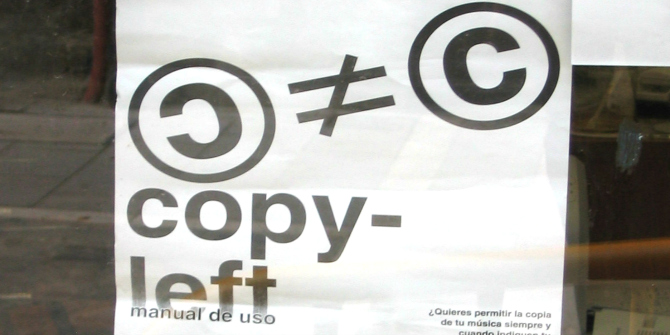 From World War II to the early 1970s, social science research expanded in dramatic and unprecedented fashion. This volume examines how, why, and with what consequences this rapid expansion depended on the entanglement of the social sciences with the Cold War. The contributions reveal how scholars contributed to long-standing debates about knowledge production, liberal democracy, and human nature in an era of diplomatic tension and ideological conflict. Students should be introduced to this book in an effort to make them think critically about their own discipline’s relationship with the national and global context, writes Jason Brock.
From World War II to the early 1970s, social science research expanded in dramatic and unprecedented fashion. This volume examines how, why, and with what consequences this rapid expansion depended on the entanglement of the social sciences with the Cold War. The contributions reveal how scholars contributed to long-standing debates about knowledge production, liberal democracy, and human nature in an era of diplomatic tension and ideological conflict. Students should be introduced to this book in an effort to make them think critically about their own discipline’s relationship with the national and global context, writes Jason Brock.
This originally appeared on LSE Review of Books.
 Cold War Social Science: Knowledge Production, Liberal Democracy, and Human Nature. Mark Solovey and Hamilton Cravens (eds.). Palgrave Macmillan. January 2012.
Cold War Social Science: Knowledge Production, Liberal Democracy, and Human Nature. Mark Solovey and Hamilton Cravens (eds.). Palgrave Macmillan. January 2012.
Even before this new volume, studies of the social sciences and their development in the post-Second World War era have been somewhat in vogue of late. This book focuses on the movements experienced in US social science and largely eschews a discipline-by-discipline approach in favour of exploring broader themes at work across the social sciences during the period. There are, of course, merits to both approaches, but I personally found that the structure of this volume encouraged me as a reader to think acutely about the connections between the social sciences; something that is especially important given that the chronological period in question is one in which the individual disciplines became more specialised and divided.
It would be wrong, as Theodore Porter points out in his foreword to the book, to consider social science to have been suddenly and completely deprived of its freedom in the post-war world. Yet the period was certainly one of considerable change in the attitude of the social sciences and their relationship to knowledge production. As Porter posits, it was the intersection of McCarthyism, the lure of the natural sciences as a model, and the desire to be seen as providing empirical solutions to social problems that precipitated the shift towards a position of neutral objectivity in social science in an effort to depoliticise scholarship, emphasising instead its technocratic credentials. In a sense, many of the issues that were central to the theoretical underpinnings of social science research in the latter half of the twentieth century still have resonance in today’s world.
The volume itself is divided into three sections covering ‘Knowledge Production’, ‘Liberal Democracy’, and ‘Human Nature’, with each section consisting of four chapters. Kaya Tolon’s contribution entitled ‘Future Studies: A New Social Science Rooted in Cold War Strategic Thinking’ captures the centrality of the Cold War’s important impact upon an area of academic study, whist also providing an interesting exposition on an under-discussed field. Tolon tells us about the emergence and growth of futurology – or future studies – as a form of scholarship in the post-1945 period. Unlike earlier futurists, who had largely used the future as a rhetorical device (one might call to mind various utopian theorists), the new trend amongst this group of social scientists was towards quantitative forecasts and mathematical hypotheses in an effort to propose sound policy prescriptions for issues such as population growth and maintenance of an adequate food supply. The guiding principle of this approach was the desire to provide better advice to policy makers themselves. Future studies is a discipline that bucks the general trend of social science during the period in as much as it was a multi-disciplinary field that brought together diverse individuals from different methodological backgrounds. It was not, however, a truly inter-disciplinary approach – Tolon writes about the identity crisis that the field suffered from in its earlier years – and was ultimately subsumed and compartmentalised by the other social sciences during the 1970s and beyond. As a whole, the field is indicative of the Cold War mentality of strategic long-term thinking, alongside those shorter-term concerns that were based upon specific scenarios. Its growth was spurred on by the advent of new and dedicated journals and, slightly unusually, it also crossed the Cold War’s ideological divide since many futurists were active in the Soviet Union (as contributors to the Five Year Plans, for example). This fact allows us to see the political dimension of social science in sharper focus since, as Tolon says, ‘the goals of the Soviet futurist differed dramatically from that of a futurist with a capitalist persuasion’ (p. 51).
Howard Brick’s essay on neo-evolutionist anthropology also stands out in the book. The neo-anthropologists were, not unlike the futurists, an international movement and challenged the idea of a simple binary world divided between the superpowers’ spheres of influence. More broadly, they challenged the Eurocentric bias of modernisation theory that held sway in the 1950s and 1960s and offered instead a critique of Western imperialism, precipitating a ‘world turn’ in American scholarship during the 1970s and 1980s in the process. The development of the concept of ‘transnational’ factors at play in the world was also significant; this idea having had an impact even beyond the social sciences.
There are too many strong chapters in this book to list in detail, but of those I have not otherwise detailed Hunter Heyck’s contribution on ‘Producing Reason’ and Hamilton Cravens’ piece on the conservative turn of social science deserve special mention. My two main criticisms of the book as a whole are, firstly, that the idea of ‘Cold War social science’, a term which has gained some academic currency, is often too monolithic to express the true complexity of the various factors affecting academia in the period (although many chapters appear to be aware of this, and Mark Solovey tackles the issue in his introduction). The second issue is that too little time is spent critically considering the idea of the Cold War itself and its construction as part of a national narrative. Fortunately, the recently published Uncertain Empire: American History and the Idea of the Cold War performs this particular task well and can be recommended as a companion volume.
In the main, I suspect that most readers will be attracted to a specific chapter or section of the volume that coincides with their own interests. The audience is likely to be primarily drawn from postgraduate students and academics, although I would add that it is exactly the kind of book that undergraduate social science students should be introduced to in an effort to make them think critically about their own discipline’s relationship with the national and global context (I imagine that some will disapprove of this task, but in this case the veiling of the goal under a historical approach provides a convenient sleight of hand).
————————————————-
Jason Brock is a PhD candidate and Visiting Tutor in the Department of History at Royal Holloway, University of London. His thesis is a study of J.A. Hobson’s economic and political thought and he is more broadly interested in the history of economic ideas and political economy. Jason currently teaches undergraduate and postgraduate classes in modern British and European history as well as the history of political thought and the philosophy of history. Read more reviews by Jason.








1 Comments